Nausheen Eusuf’s debut collection Not Elegy, But Eros is conversing with giants. Wallace Stevens, Robert Frost, Emily Dickinson, T.S. Eliot, Freud, and a slew of other great names are sitting at the table. In both form and content, Eusuf is serving what these great minds have tackled before.
NewPages Blog
At the NewPages Blog readers and writers can catch up with their favorite literary and alternative magazines, independent and university presses, creative writing programs, and writing and literary events. Find new books, new issue announcements, contest winners, and so much more!
Not Elegy, But Eros
Spread the word!
Meet Behind Mars
The stories in Meet Behind Mars by Renee Simms touch on womanhood, family, sacrifice, and morals. Some of the tales are twisted with a bit of surrealism, a little Twilight Zone to counterbalance the absolutely real, cramped truth of growing up not only period, but a woman and black.
Spread the word!
Experience in Groups
Let’s start here: Experience in Groups is a book of poetry. Specifically, it’s a book of poetry written by a well-established poet—Geoffrey G. O’Brien—which means that I’m sure that a lot of it went right over my head. But, all I can do is explain the things that I thought I understood, and see where it goes from there. Perhaps everything I say in the next seven hundred words or so is gobbledygook, but then again, there’s a chance that it’s not. Overall, that’s kind of how I felt about Experience in Groups.
Spread the word!
Buddha’s Dog & Other Meditations
Buddha’s Dog & Other Meditations by Ira Sukrungruang is a testament to the variety of forms nonfiction writing can reach as well as this author’s mastery of each. For teachers of creative nonfiction, this text models a range of approaches; for students of CNF (whether formally enrolled or not), this is a wonderful mentor text; and for us more general readers, this is a book to expand our experience with great satisfaction.
Spread the word!
Starting with Goodbye
Starting with Goodbye: A Daughter’s Memoir of Love after Loss is a powerful new book by Lisa Romeo about the way our relationships with those we love change and deepen, even after death. Telling the story both of her father’s death and of her need to heal and go forward, this memoir is a moving account of the never-ending love between a father and daughter.
Spread the word!
The Lion’s Binding Oath and Other Stories
Ahmed Ismail Yusuf’s The Lion’s Binding Oath and Other Stories, presents an insider’s view of everyday life in Somalia during the mid to late 20th century. Yusuf had fled his birth country in the late 1980s during the Somalia civil war, and has since lived, educated himself, and worked in Minnesota.
Continue reading “The Lion’s Binding Oath and Other Stories”
Spread the word!
The Undressing
The Undressing examines the physical, bodily relationship with the spiritual relationship between two lovers. There are elements of the political—the strongest portions of the book—and of the foreign. Li-Young Lee’s collection is philosophical, not exactly accessible for a first-time poetry reader, but one that with re-readings gathers depth and meaning each time.
Spread the word!
The Drowning Boy’s Guide To Water
Whereas the race card is now everyone’s card
in a deck I did not cut. I hate card games,
the conceit of the shuffle. I hate when white people
hate white people because hating white people
is fashionable. A person’s color is a still thing
to hate.
—from “Nonbinding Legislation, or a Resolution”
Cameron Barnett’s first collection, published by Autumn House Press, is powerful. Each poem in The Drowning Boy’s Guide to Water is a full meal, and not always easy to digest. His craft is superb, pure excellence in both expression and thrust, but the themes are exhausting, necessary, and yes, every single thing is race. Barnett’s endurance analyzing America’s binary black and white world is honorable, essential, and true, yet leaves the reader bone-tired.
Spread the word!
Dots & Dashes
. . . I met my husband in a class
on Ovid where we learned longing
changes us
to limestone, or causes us
to caress the white bull—no matter
that he’s animal and his child minotaur,
the dividedoffspring of our love.
—from “At the Reading of the Antiwar Poets, 2007”
Every time I read Jehanne Dubrow’s work, I write a good poem. In fact, after reading and reviewing her book The Arranged Marriage over a year ago, I wrote a whole chapbook, published the following year. Perhaps she is something of a muse to me. Perhaps this is why, after spending nearly two years in Denton, Texas, and nearly also working as an adjunct instructor at the University of North Texas where she serves as an associate professor, I did not try to meet her even though I was encouraged to.
Maybe our muses are best left alone, enigmas granted asylum from gaze and inquiry. In any case, Dubrow continues to bring me good luck and inspire more poems.
Spread the word!
Swim
With the #metoo movement still changing the conversation on how women are treated in the US, this book of stories set in the 60s felt culturally relevant rather than retro. In three short fictions, Sandra Scofield examines the ambivalence and vulnerability of three women as well as the entitlement and ignorance of the men in their lives. Gender, more telling of one’s mobility and expectations in the 1960s than today, casts the male and female characters in narrowly defined roles. Women long for masculine freedoms and adopt a rebellious edge to keep themselves out of prepackaged social norms, while the various men in their lives conform to egoism, salvific nostalgia, and violent acts of privilege.
Spread the word!
Poetry :: Ryan Thorpe
 IKEA CHOICES
IKEA CHOICES
by Ryan Thorpe
The family of three examines
the dining table for four,
calculating out their marriage
prospect. They are unsure
of the wood’s soft shine,
doubting it will survive past
two winters. . .
[Love the way this poem ends. Read the rest in the Apple Valley Review online Spring 2018 issue.]
Spread the word!
The New Academy :: Cast Your (Nobel) Vote
Following the suspension of the 2018 Nobel Prize for Literature, The New Academy was created “to warrant that an international literary prize will be awarded in 2018, but also as a reminder that literature should be associated with democracy, openness, empathy and respect.”
Librarians from across Sweden were invited to submit nominations of authors for the prize; voting opened to the global public on July 10 and will close on August 14.
The top four nominations from this long list will receive final assessment for the award by an “expert jury” comprised of: Jury President Ann Pålsson, editor and independent publisher; and Jury Members Lisbeth Larsson, Professor of Literature, Gothenburg University; Peter Stenson, editor and critic; and Gunilla Sandin, librarian director.
The winner will be announced October 14.
Spread the word!
Black Warrior Review – Spring/Summer 2018
Lisa Krannichfeld’s “Undomesticated Interior No. 7” dominates the cover of the spring and summer issue of Black Warrior Review. Its subject, a young black woman wearing a flashy blue suit, mint green button down, and screaming red boots, sits defiantly at the edge of a chair, ready for movement. An image of a snarling wolf hangs on the wall just behind her. In her artist’s statement, Krannichfeld says: “Images are vehicles for the teaching of history and it is the historical imagery of the female gender I aim to counterbalance.” Looking over the eight other images Krannichfeld has contributed to the issue, all of women in ornamentally-patterned suits, sitting in wallpapered rooms with framed images of bared fangs surrounding them like a warning, an aura, it’s clear that these are not the “doll-like women,” the “decorations” of the past; instead, Krannichfeld’s subjects throw the male gaze back at their viewers, watching with confidence, hands running together as they contemplate their opponent’s next move. And that move had better be good.
Continue reading “Black Warrior Review – Spring/Summer 2018”
Spread the word!
North Dakota Quarterly – Summer/Fall 2017
Published by the College of Arts and Sciences from the University of North Dakota, the North Dakota Quarterly is a literary and public humanities journal that has existed for over 100 years, providing articles, essays, fiction, and poetry. They bring readers another great issue filled to the brim with a wide variety of enjoyable stories, essays, and poems.
Continue reading “North Dakota Quarterly – Summer/Fall 2017”
Spread the word!
The Gettysburg Review – Spring 2018
“A good story was always about more than true or false. It was always about more than the story,” contemplates the narrator of Kyle Mellen’s fiction piece “Ladies and Gentlemen, the Couch.” The Spring 2018 issue of The Gettysburg Review offers something more than “the story”: authors and poets share truths, laughs, sometimes along with tears, and always new discoveries. This generously-sized and curiously-executed issue is a great example of editors’ commitment: they “look for writers who can shape language in thoughtful, surprising, and beautiful ways and who have something unique to say, whatever the subject matter or aesthetic approach.”
Spread the word!
Barstow & Grand – Fall 2017
First volume, first issue, what should one expect? A group of locals got together to celebrate their neighborhood, what should one expect? A group of writers put together their own journal so being published became easier, what to expect?
Spread the word!
Creative Nonfiction – Spring 2018
With Mary Shelley’s fiction as the creative muse, it’s unsurprising that Creative Nonfiction’s issue, dedicated to real life Frankenstein stories, boasts all six essays by women. But while editor Lee Gutkind warns, “this issue is not for the faint of heart,” I disagree: the horror elements sprung from Shelley’s novel remain peripheral. This issue establishes the need for compassion, no matter the monsters in our lives.
Spread the word!
MAKE – 2017-2018
MAKE, published annually out of Chicago, dedicates this issue to belonging. This theme is unsurprising given the journal hosts the annual Lit & Luz Festival of Language, Literature, and Art in Chicago and in Mexico City, encouraging cross-pollination of creativity across culture and language. Bringing together fiction, nonfiction, poetry, and translation, this issue of MAKE stretches belonging to encompass belonging in our bodies, belonging within (and to) a place, and belonging within language.
Spread the word!
Goodbye Glimmer Train
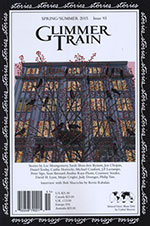 After nearly 30 years of continuous publication, Glimmer Train has announced that they will be closing shop after this next year of publication. Submissions are still being accepted to finish out with issue #106, but after that, sisters Linda Swanson-Davies and Susan Burmeister-Brown – or as we call them, The Glimmer Train Sisters – plan to retire the publication entirely.
After nearly 30 years of continuous publication, Glimmer Train has announced that they will be closing shop after this next year of publication. Submissions are still being accepted to finish out with issue #106, but after that, sisters Linda Swanson-Davies and Susan Burmeister-Brown – or as we call them, The Glimmer Train Sisters – plan to retire the publication entirely.
While they have received many offers and inquiries to let others take over the renowned journal, The Sisters had already decided against this option. In a form letter response to such inquiries, The Sisters. . .
Spread the word!
American Life in Poetry :: Terri Kirby Erickson
 American Life in Poetry: Column 695
American Life in Poetry: Column 695
BY TED KOOSER, U.S. POET LAUREATE
In one of my recent columns I wrote about the importance to the overall effect of a poem of having a strong ending, and here’s a fine example of that. It’s by Terri Kirby Erickson, a North Carolinian, from her book, Becoming the Blue Heron, published by Press 53. Others of Erickson’s poems are available in the column’s archives at www.americanlifeinpoetry.org.
My Cousin, Milton
My cousin, Milton, worked for a cable company.
The boy I knew when we were children
had fists that were often clenched, his face set like
an old man whose life had been so hard,
it hardened him. But the man’s hands opened to let
more of the world in. He sent the funniest
cards to family and friends at Christmas, laid down
cable so others could connect. Yet, he lived
alone, kept to himself much of the time, so when
his sister found his body, he’d been gone
a good while. He died young at fifty-seven, without
fuss or bother. No sitting by the bedside
or feeding him soup. He just laid himself down like
a trunk line and let the signal pass through.
We do not accept unsolicited manuscripts. American Life in Poetry is made possible by The Poetry Foundation (www.poetryfoundation.org), publisher of Poetry magazine. It is also supported by the Department of English at the University of Nebraska, Lincoln. Poem copyright ©2017 by Terri Kirby Erickson from Becoming the Blue Heron (Press 53, 2017). Poem reprinted by permission of Terri Kirby Erickson and the publisher. Introduction copyright ©2018 by The Poetry Foundation. The introduction’s author, Ted Kooser, served as United States Poet Laureate Consultant in Poetry to the Library of Congress from 2004-2006.
Spread the word!
Trump Sonnets by Ken Waldman
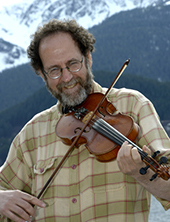 Frustrated with the current policital administration? You protest, rally, write letters, get yourself and others ready to vote…what more can you do? For poet and musician Ken Waldman (aka Alaska’s Fiddling Poet), there’s poetry. Sonnets to be exact, and a lot of them. With two volumes already completed and one more (at least) on the way, Waldman is taking this administration to task – and perhaps salvaging his own sanity as well as that of his readers – responding to the daily fodder by turning it to his muse for poetry.
Frustrated with the current policital administration? You protest, rally, write letters, get yourself and others ready to vote…what more can you do? For poet and musician Ken Waldman (aka Alaska’s Fiddling Poet), there’s poetry. Sonnets to be exact, and a lot of them. With two volumes already completed and one more (at least) on the way, Waldman is taking this administration to task – and perhaps salvaging his own sanity as well as that of his readers – responding to the daily fodder by turning it to his muse for poetry.
Like many of us, in a stunned stupor the day after the election, Wednesday, November 9, 2016, Waldman writes that he was “processing Donald Trump’s surprise victory in the 2016 U.S. presidential election, and wrote, ‘You make George W. seem a statesman–your opening trick,’ which I turned into the first line and a half of a sonnet. A week later I wrote two more Donald Trump-inspired sonnets. Between Thanksgiving and Christmas, another 68. That’s 71 sonnets, a full-length collection. 41 were written in the voice of Donald Trump. The rest were addressed to him.” The book’s subtitle – The First 50 Days – speaks to the process many of us went through at the start.
Now in our second year of Trump’s reign, Waldman continues to see us through with Trump Sonnets Volume 2: 33 Commentaries, 33 Dreams. “Half of this sequel’s 66 poems is incisive commentary,” writes Waldman,. “Half, dreams that I imagine Donald Trump might have, and those are in Trump’s voice.”
Both volumes, as well as Waldman’s other books, are available through SPD Distribution or directly from Waldman. Visitors to his website can also view YouTube videos of Waldman reading the poems with a little bit of his iconic fiddling style thrown in.
Spread the word!
HA&L Celebrates Bertrand Russell
 In addition to celebrating its tenth anniversay of publication, the newest issue of Canada’s Hamilton Arts & Letters (11.1) is also a celebration of Bertrand Russell and the 50th Anniversary of the Russell Archives.
In addition to celebrating its tenth anniversay of publication, the newest issue of Canada’s Hamilton Arts & Letters (11.1) is also a celebration of Bertrand Russell and the 50th Anniversary of the Russell Archives.
Guest Editor Rick Stapleton [pictured] writes in his introduction, “In 1968 McMaster University purchased the first instalment of the archives of Bertrand Russell (1872-1970), a vast collection of letters, manuscripts, photographs, books and other personal material of one of the 20th century’s greatest philosophers, writers, and peace activists. At the time, the 96-year-old Russell was in need of funds to support his peace work, and McMaster’s university librarian, William Ready—renowned for his ‘buccaneering’ style of acquiring collections—was able to bid successfully for the archives. Now, 50 years later, we celebrate that event with this special issue of Hamilton Arts & Letters magazine, devoted to Bertrand Russell.”
The issue is packed with poetry, artwork, and articles, including an Interview with Kenneth Blackwell, the original Bertrand Russell archivist by Wade Hemsworth; “’I Have Never Been a Complete Pacifist’: Bertrand Russell on Peace and War in the Twentieth Century” by Andrew Bone; “Bertrand Russell and The Revolution in Twentieth Century Philosophy” by Nicholas Griffin; “A Rivalry? – Russell’s Lovers, Lady Ottoline Morrell and Lady Constance Malleson” by Sheila Turcon; “Hanging out with Bertrand Russell” by Terry Fallis; and “Bertrand Russell: Remembering a Public Intellectual for Our Time” by Henry A. Giroux.
Hamilton Arts & Letters is an online publication; the full issue can be accessed here.
Spread the word!
Books :: The Esthetic Apostle Introduces First Chapbook
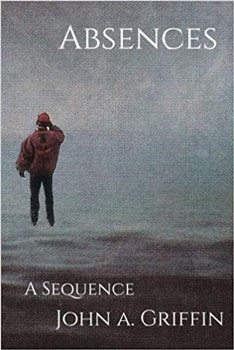 New out this month is the first chapbook from literary magazine The Esthetic Apostle: Absences: A Sequence by John A. Griffin. Accompanied by collages by artist Martine Mooijenkind, the chapbook explores forms of loss. In “Relic,” the speaker notes: “It is November and a concussed fog hangs above the lake,” and this fog seems to settle over the rest of the pieces within the collection, somber and haunted by absences.
New out this month is the first chapbook from literary magazine The Esthetic Apostle: Absences: A Sequence by John A. Griffin. Accompanied by collages by artist Martine Mooijenkind, the chapbook explores forms of loss. In “Relic,” the speaker notes: “It is November and a concussed fog hangs above the lake,” and this fog seems to settle over the rest of the pieces within the collection, somber and haunted by absences.
From the publisher: “Absences addresses the themes of loss of youth, loss of innocence, isolation, separation, exile, death, the absence of familiarity, affection, and above all the loss or absence of love. The sequence meditates on the natural world but finds little comfort there. There are no idyllic, romantic refuges from the self, and pathetic fallacies remain just that: instead of providing a balm to the sick heart, the dales of Arcady merely accentuate its angst. The poems find fitting motifs in poetic echoes and these are channeled into the poems’ movement to harmonize their rhythms and oscillations and to achieve a kind of unsettling but restorative equipoise. The sequence resonates with allusions to classical mythology, Virginia Woolf, Gabriel Garcia Marquez, Julio Cortazar, Franz Kafka, Johann Georg Hamann, Paul Celan, and Bruno Schulz, and tries to weave its patchwork aesthetic by drawing on their disparate but unified themes. Ultimately, the sequence is a celebration of life, even if life’s great peroration is death, and even if we all die the same death over and over again.”
Visit the publisher’s website to pick up your copy.
Spread the word!
Aquifer Now Accepting Film Submissions
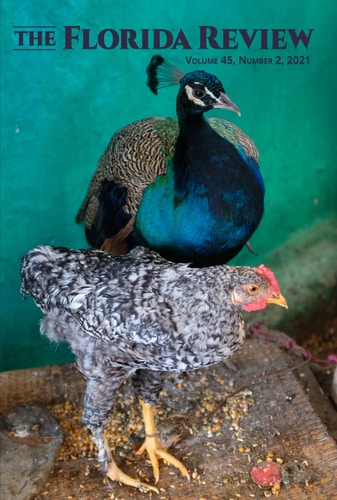 The Aquifer, the online journal of The Florida Review, is now accepting film and video work as they expand their visual arts and new media offerings for readers.
The Aquifer, the online journal of The Florida Review, is now accepting film and video work as they expand their visual arts and new media offerings for readers.
“We are looking for experimental works of film or video that are 15 minutes or less and utilize moving images as a means to poetic expression, formal exploration, or abstract and open-ended narratives. Compelling, personal works that push the boundaries of cinematic convention will also be considered for publication.”
For more information, see the Aquifer announcement.
[The Florida Review 42.1 2018 cover art: Dengke Chen, “Tank Man,” digital illustration]
Spread the word!
Latinx Latina Latino Writers Wanted
 The Florida Review is seeking submissions from Latinx / Latina / Latino writers for a special feature. Work submitted to this category will be considered for both the digital and print editions of this feature. Fiction, creative nonfiction, poetry, graphic narrative (color or black-and-white), hybrid writing, visual art, and digital media are all welcome. Edited by Nicole Oquendo [pictured]. Submissions accepted through September 1, 2018. For more information, click here.
The Florida Review is seeking submissions from Latinx / Latina / Latino writers for a special feature. Work submitted to this category will be considered for both the digital and print editions of this feature. Fiction, creative nonfiction, poetry, graphic narrative (color or black-and-white), hybrid writing, visual art, and digital media are all welcome. Edited by Nicole Oquendo [pictured]. Submissions accepted through September 1, 2018. For more information, click here.
Spread the word!
Spend a Night with F. Scott and Zelda
 If you’re traveling anywhere near Montgomery, Alabama, consider spending the night in the former home of F. Scott and Zelda Fitzgerald which now houses the Fitzgerald Museum and a two-bedroom apartment. “This historic home houses the only dedicated museum to F. Scott & Zelda Fitzgerald in the world. The family lived here from 1931 until 1932, writing portions of their respective novels, Save Me The Waltz and Tender Is The Night, during their time here.”
If you’re traveling anywhere near Montgomery, Alabama, consider spending the night in the former home of F. Scott and Zelda Fitzgerald which now houses the Fitzgerald Museum and a two-bedroom apartment. “This historic home houses the only dedicated museum to F. Scott & Zelda Fitzgerald in the world. The family lived here from 1931 until 1932, writing portions of their respective novels, Save Me The Waltz and Tender Is The Night, during their time here.”
The apartment is listed on Airbnb and can be rented for $150 a night. Guests can also visit the museum during its open hours, maybe helping make Montgomery your destination!
Spread the word!
Calling All Crones!
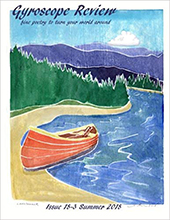 Gyroscope Review: Fine Poetry to Turn Your World Around has announced a call for submissions for The Crone Issue to feature contemporary poetry from poets who identify as women and are over the age of 50.
Gyroscope Review: Fine Poetry to Turn Your World Around has announced a call for submissions for The Crone Issue to feature contemporary poetry from poets who identify as women and are over the age of 50.
“Women over 50 are often underrepresented in poetry publications, so we are choosing to offer a space and a voice to the wise women out there. We want work that celebrates the ideas of crone, wise woman, matriarch, post-menopause, grandmother, elder, strength, experience,” the editors write in their CFS. They challenge: “Shake up our ideas of the female over-50 demographic. Show us something fierce, something powerful, something that cannot be ignored. Cast off the restrictions around what you have been told you can talk about. Break your silence.”
Submissions are open until September 15 or until the editors have accepted enough content to fill the issue – whichever comes first. So – don’t delay! Send your best work today!
Spread the word!
2018 Dogwood Literary Award Winners
Volume 17 of Dogwood: A Journal of Poetry and Prose features the winning entries of their 2018 Literary Awards. In addition to publication, Dogwood doubled their cash prizes to $1000 for each winning author. Each author’s name is linked to a page with more information about them.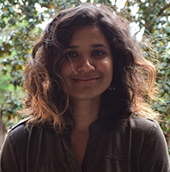
Fiction Prize
Judge Nicholas Montemarano
“There You Are” by Landon Houle
Poetry Prize
Judge Gillian Conoley
“Early Marriage, 1982, Endless Rain” by Kim Garcia
Nonfiction Prize
Judge Patrick Phillips
“To Learn About Smoke One Must First Light a Fire” by Misha Rai [pictured[
The 2019 Dogwood Literary Awards are open for submission until September 5, 2018.
Spread the word!
Lit Mag Covers :: Picks of the Week
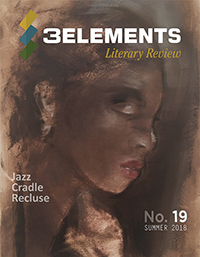
Each issue of 3Elements publishes works that respond to three words for that issue. The Summer 2018 issue words were Jazz, Cradle, Recluse. Gregg Chadwick’s artwork “Jazz Life (Central Avenue)” is the featured cover image.

The cover image of River Teeth: A Journal of Nonfiction Narrative is, appropriately, a sunset photo by David FitzSimmons, ushering out nineteen years of publishing as the journal heads into their twentieth anniversary!
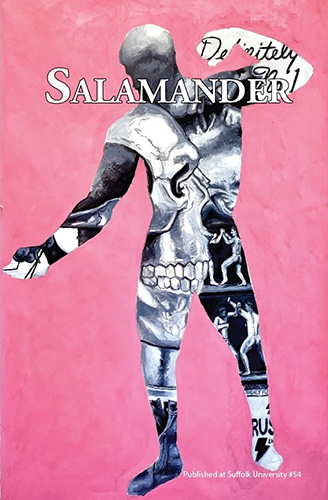
“Lotus III” by Colette Brésilla is the unique oil on canvas art for the cover of the Spring/Summer 2018 issue of Salamander (#46).
Spread the word!
Poets and Editors Feature
The Summer 2018 issue of Sheila-Na-Gig online includes a special section of works by poets who are also editors (or is that vice versa?). Featured poets and their publications:
 Glen Armstrong / Cruel Garters
Glen Armstrong / Cruel Garters
Sarah Diamond Burroway / Jelly Bucket
Alan Catlin / Misfit Magazine
Rita Chapman / december magazine
Kersten Christianson / Alaska Women Speak
Sandy Coomer / Rockvale Review
AR Dugan / Ploughshares
Catherine Fahey / Soundings East
Lynne Marie Houston / Five Oaks Press
James Croal Jackson / The Mantle
Jen Karetnick / SWWIM Every Day
Sergio Ortiz / Undertow Tanka Review
Joseph Shields / Nerve Cowboy Magazine
Dan Sicoli / Slipstream Magazine and Press
Martin Willitts Jr / The Comstock Review
Carol Lynn Stevenson Grellas [pictured] / The Orchards Poetry Journal
Spread the word!
Where what3words Are You?
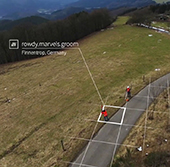 As a kid (and adult for that matter) who was forever unable to remember her numerical lock combinations, what3words is the most brilliant invention of all time. And who among us readers/writers can’t absolutely fall in love with this concept: The entire planet mapped out in three meter squares with each one assigned a unique three-word sequence.
As a kid (and adult for that matter) who was forever unable to remember her numerical lock combinations, what3words is the most brilliant invention of all time. And who among us readers/writers can’t absolutely fall in love with this concept: The entire planet mapped out in three meter squares with each one assigned a unique three-word sequence.
Download the app to your phone, and no matter where you go, you can find you three-word location. Give your three-word location to someone, and they can find you!
I can only imagine that some poets have already gotten a hold of this and are integrating it into their writing – right? How about engaging young students in both geography and writing. Come up with three words, put them in, and see where that location is – the possibilities are endless and exciting! Check it out for yourself!
Spread the word!
Sustainability
Toward the middle of Sustainability: A Love Story, I decided to read slower in order to sustain it, if only for a minute longer. I didn’t want the journey to end, just as the author, Nicole Walker, doesn’t want the world to end; there are too many great things to live for, this book being one of them. It is composed of thirty-eight essays, all of which read like prose poems, stuffed with scientific research on topics such as recycling, McDonald’s, and suicide. Most of all, it’s a love story written to Portland, Oregon; Walker’s family; and the little blue dot.
Spread the word!
Angelitos
Reading graphic novels sort of makes me feel like I’m ten years old, but when they include issues like poverty, molestation, and the 1985 Mexico City earthquake, I realize that a ten-year-old me wouldn’t know what to think. I still don’t, for that matter. Angelitos by Ilan Stavans and Santiago Cohen throws you straight into the lion’s den of Mexico, where homeless children run amok, and the only one that seems to care is a Catholic priest by the name of Father Chinchachoma.
Spread the word!
Gloved Against Blood
Gloved Against Blood by Cindy Veach is about the textile industry in the 19th century, and the people whose lives it directed, including the lives of Veach’s ancestors. Her poems bring to light the oppressing conditions the women who worked at the mills endured. She uses found poems from news and slave narratives to add a level of expose to her work. The poems also weave a history of Veach’s family, and she hints at the fact that this history, like many hardships endured, is never completely shaken but inherited, like a thimble passed down might hold a stain of blood.
Spread the word!
That One Cigarette
What if Lee Harvey Oswald’s assassination of JFK was thwarted? What if a hardworking FBI agent discovered the 9/11 plot and arrested the terrorists before they boarded planes? What if an 80-year-old Martin Luther King swore Barak Obama into office as the 44th president? What if a California screenwriter and professor, Stu Krieger, followed four families through these what-ifs from 1963 to 2009? Well, that would be That One Cigarette.
Spread the word!
Atlas of the Body
If you happen to notice the number of pages in this book before reading the review, don’t think you’ve seen a typo. Nicole Cuffy’s Atlas of the Body is indeed 17 pages long, and she fills out those pages with small scenes that open a larger story.
Spread the word!
The Comet’s Tail
The Comet’s Tail is a book about memory, the lack of memory, and the slow and painstaking process of recreating life and meaning after a coma.
Spread the word!
Soft Volcano
What other dangers will you step through tonight?
The hours baggy and gathering.
There is nothing mere about this.
I wanted like hot skin thumping around
the splinter caught within. That, and a tidy gold peace.
—from “Where God Was Not”
Libby Burton’s collection Soft Volcano is a delicate and sensuous meditation on the quotidian. By taking the smallest detail and transcending into the metaphysical, Burton is doing what the best writers do, asking questions that linger in the mind and heart.
Spread the word!
Bikequity
Elly Blue of Microcosm Publishing has complied a mixed-genre anthology including essays, poetry, fiction, and even a recipe on cycling, empowerment, and the politics around transport and urban living. If you live in Portland, have a tendency for activism, or have just traded in your used Ford Corolla for a refurbished fixie, then this just might be the zine to slip into your back pocket for that next ride.
Spread the word!
Monster Portraits
Not since Jose Luis Borges’s Manual de zoología fantástica, a dictionary of 120 mythical beasts meant to be “dipped into” and read “randomly, just as one plays with the shifting patterns of a kaleidoscope,” have I picked up such an intriguing and beautiful collection as Monster Portraits by brother-sister, artist-author, extraordinaire collaborators, Del and Sofia Samatar. The fact that Borges was not a Somali-American growing up in the 1980s makes all the difference between the two works. Style, structure, and intention draws parallels, but the narrative of “other,” of foreign, of nomad, adds a profound political and emotional layer.
Spread the word!
The Cloud Museum
A figure named Alice dominates the initial section of Beth Spencer’s poetry book, The Cloud Museum. Is Alice real? You’ll have to judge for yourself. The second section of the book swirls around the definitely real artist Jay DeFeo.
Spread the word!
Memoir Magazine Online Workshops and Classes
 In keeping with Memoir Magazine‘s mission, “to be a witness to both factual and emotional truths that resonate with the human heart by supporting writers and artists in sharing their stories—whether personal, social or political– through publication, education, and advocacy,” the publication offers Memoir Magazine University, “a safe space dedicated entirely to the development of writers and stories that need to be heard.”
In keeping with Memoir Magazine‘s mission, “to be a witness to both factual and emotional truths that resonate with the human heart by supporting writers and artists in sharing their stories—whether personal, social or political– through publication, education, and advocacy,” the publication offers Memoir Magazine University, “a safe space dedicated entirely to the development of writers and stories that need to be heard.”
Two summer classes coming up are Anonymous Memoir Writing Workshop for Sexual Assault Survivors with Memoir Magazine Founder and Editor-in-Chief Mary McBeth (July 9 – August 20; open times) and Writing To Heal with Jerry Waxler [pictured] (July 10 – August 21, Tuesdays 7:30-9pm EST; July 12 – August 23, Thursdays 12 noon-1:30 EST).
Future classes will include Intro to Memoir and Memoir 101. For more information, visit Memoir Magazine’s website.
Spread the word!
2018 APPF Registration is Open!
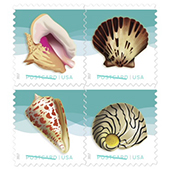 Not to rush your summer, but July 4th signals the opening of registration for the annual August Poetry Postcard Festival!
Not to rush your summer, but July 4th signals the opening of registration for the annual August Poetry Postcard Festival!
This is a FAVORITE event for me and many others who have been doing it since it started over ten years ago, as well as for newbies – who are always welcome to join!
Visit Paul E Nelson’s webpage for full instructions, but the basic premise is this: Registrants are grouped with 31 other participants and each group member gets a list of names and addresses. You start with the name below yours on the list and each day, write a poem on a postcard and send it to that person. The next day, you go to the next name on the list, write, send, repeat.
The idea is to be spontaneous in writing these poems. They aren’t supposed to be prewritten (although some folks do type or reprint for the sake of legibility), and as much as possible, written in the moment. In the past, I’ve known a writer to focus on colors as a theme, another randomly landed on a word in the dictionary and made that their inspiration. Since the only requirement is to write and send a card a day, the rest is up to each writer’s imagination and motivation. The postcards can be anything at all – some people make their own, some use photos, others are cheesy tourist postcards, some are vintage – it’s totally up to the sender.
There is a $10 registration fee to help handle the oversight. I’m happy to pay this, and the domestic and occassional international postage – considering how much I spend on conferences each year, some of which I walk away from wondering what I gained from them. The APPF has never disappointed. Not only has it inspired my own writing in numerous ways, there is something so uniquely enjoyable about going to the mailbox each day, wondering what I might be gifted from another poet out there somewhere in the world.
Challenge yourself to do this. Participate. Enjoy it. Struggle through it. At the end of the month, you’ll feel enormous satisfaction and even a bit a sadness that it’s over.
Spread the word!
Still Point Arts Celebrates Ten Years
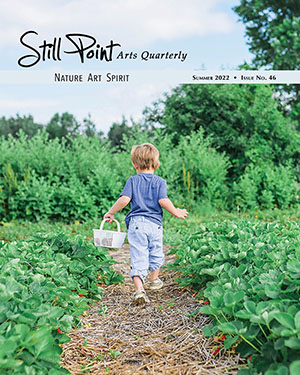 Celebrating ten years and thirty issues of Still Point Arts Quarterly, Founding Editor Christine Brooks Cote’s introduction to the Summer 2018 issue reads like an advice article for anyone with the idea to start up a journal.
Celebrating ten years and thirty issues of Still Point Arts Quarterly, Founding Editor Christine Brooks Cote’s introduction to the Summer 2018 issue reads like an advice article for anyone with the idea to start up a journal.
Among the things she figured out along the way was what made for publishable submissions. She came up with these three criteria: “1) they have to be so interesting that I can’t stop reading until I get all the way to the end; 2) they have to be well written – I shouldn’t have to reread a paragraph or a sentence several times, or even twice, to figure out what is being said; and 3) they have to strike just the right chord inside me and make me feel that what I just read should be read by everyone.”
Over this years, she notes, this search for quality submissions has not changed, nor her “aim to present them as respectfully and tastefully as possible. Each journal is a creation, a work of art.”
Cote admits one thing that has changed over the years: “my respect, admiration, and gratitude for the artists and writers whose work we publish has grown exponentially. I never imagined when I started this work that I would have the pleasure of connecting with so many thoughtful and inspiring individuals who produce work that regularly stops me in my tracks. Truly, connecting with the people who contribute to this publication has been immensely joyful and fulfilling, and I’ve learned so much from them. That part I didn’t expect – indeed, unexpected gifts are the best.”
May Still Point Arts Quarterly enjoy another ten years – and more – of giving such beauty and joy to readers as well as receiving!
Spread the word!
Resource :: Volunteer Lawyers for the Arts
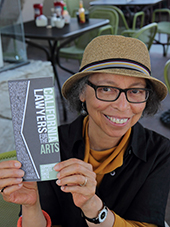 Volunteer Lawyers for the Arts (VLA) is a general term used to identify this non-profit resource that can be found in numerous communities across the country. VLAs provide low-cost or free legal aid and guidance to artists and organizations, and some will even provide consultation to artists from areas that do not have their own VLA. In the past, I’ve received phone consults from the VLA in New York prior to Michigan having its own organization. Some, such as the St. Louis VLAA include Accountants for the Arts as well. The VLAA website has a directory of VLAs with the advice that if you do not see your state listed to contact your state arts council.
Volunteer Lawyers for the Arts (VLA) is a general term used to identify this non-profit resource that can be found in numerous communities across the country. VLAs provide low-cost or free legal aid and guidance to artists and organizations, and some will even provide consultation to artists from areas that do not have their own VLA. In the past, I’ve received phone consults from the VLA in New York prior to Michigan having its own organization. Some, such as the St. Louis VLAA include Accountants for the Arts as well. The VLAA website has a directory of VLAs with the advice that if you do not see your state listed to contact your state arts council.
[Pictured: Alma Robinson, Executive Director of Califorinia Lawyers for the Arts]
Spread the word!
Southeast Review 2017 Contest Winners
The Southeast Review spring issue (36.1) features winning entries from their 2017 contests:
 Gearhart Poetry Contest
Gearhart Poetry Contest
Judged by Erin Belieu
Winner: “The Truth Takes Lunch” by Jed Myers
Finalist: “Three Nails” by Christopher Childers
World’s Best Short-Short Story Contest
Judged by Robert Olen Butler
Winner: “Friends” by Greta Schuler
Finalists: “Saint Barbara’s Day” by Elina Alter
“Shpykiv” by Alexandra Brenner
The Southeast Review Narrative Nonfiction Contest
Judged by Matthew Gavin Frank
Winner: “Crywolf” by Erica Berry [pictured]
Finalists: “The Stone Grows without Rain” by Lee Huttner
“Soundings: Field Notes on Communication with Animals and God” by Sylvia Sukop
Spread the word!
Vote Now for Your Most Loved Novels
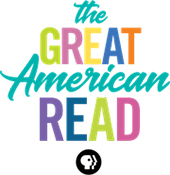 The Great American Read is an eight-part series from PBS that “explores and celebrates the power of reading, told through the prism of America’s 100 best-loved novels (as chosen in a national survey). It investigates how and why writers create their fictional worlds, how we as readers are affected by these stories, and what these 100 different books have to say about our diverse nation and our shared human experience.”
The Great American Read is an eight-part series from PBS that “explores and celebrates the power of reading, told through the prism of America’s 100 best-loved novels (as chosen in a national survey). It investigates how and why writers create their fictional worlds, how we as readers are affected by these stories, and what these 100 different books have to say about our diverse nation and our shared human experience.”
The series kicked off with a two-hour launch in May and continued with five one-hour episodes examining concepts common to the eligible novels. The finale – planned for October 2018 – will announce the results of the nation-wide vote to select America’s best-loved book.
The Great American Read website includes all the programs for online viewing as well as the list of 100 books and directions on how to vote for your best-loved novels from the list.
Spread the word!
Lit Mag Covers :: Picks of the Week
This week’s covers are from some of the many Alternative Magazines we have listed at NewPages as a reminder of this useful resource for both reading and submitting writing.
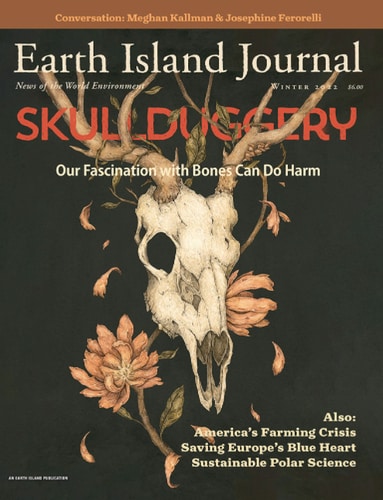
Earth Island Journal combines investigative journalism and thought-provoking essays that make the subtle but profound connections between the environment and other contemporary issues. Writers guidelines here.

The focus of Feminist Studies 44.1 (2018) is life writing and new approaches to studying women’s autobiographies, including Elizabeth Gurley Flynn, Gertrude Stein, Kamal Das, Gayle Rubin and Judith Butler, as well as works by Estelle Carol, Alexandra Ketchum, Olga Zilberbourg, Corey Hickner-Johnson, Hiliary Chute, and Ashwini Tambe. Submissions guidelines here.
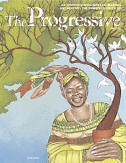
The Progressive is a journalistic voice for peace and social justice at home and abroad, steadfastly opposing militarism, the concentration of power in corporate hands, the disenfranchisement of the citizenry, poverty, and prejudice in all its guises. Writers guidelines here.
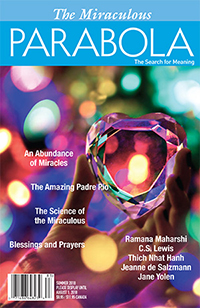
One of my favorites, Parabola is published quarterly by the Society for the Study of Myth and Tradition, a non-profit, non-denominational, educational organization. Each issue devotes 128 highly illustrated pages to a universal theme. Submission guidelines here.
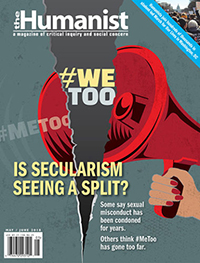
The Humanist magazine applies humanism — a natural and democratic outlook informed by science, inspired by art, and motivated by compassion — to broad areas of social and personal concern in pursuit of alternative ideas. Writers guidelines here.
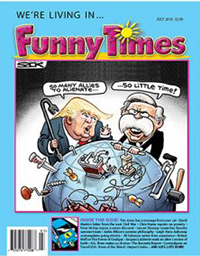
And we all need to retain our ability to laugh and bring humor into our days. The Funny Times helps us fulfill this need as America’s longest-running ad-free monthly humor publication in a newspaper format.
Spread the word!
New Lit on the Block :: Crossways Literary Magazine
The titles of WB Yeats’s first collection of poems is the inspiration behind the naming of Crossways Literary Magazine, an online quarterly of poetry and short fiction based out of Ireland.
But the core inspiration behind this new publication was Founding Editor David Jordan’s “limited success” in getting his own work published. “I decided I would go to the other side and be the publisher and the person who says yes. I figured I might have more success in this role and get satisfaction from it.” Continue reading “New Lit on the Block :: Crossways Literary Magazine”
Spread the word!
2017 Jeffrey E. Smith Editors’ Prize Winners
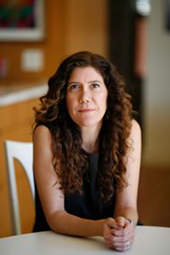 The Spring 2018 issue of The Missouri Review features the winners of the 2017 Jeffrey E. Smith Editor’s Prize.
The Spring 2018 issue of The Missouri Review features the winners of the 2017 Jeffrey E. Smith Editor’s Prize.
Fiction
Tamara Titus of Charlotte, NC, for “Exit Seekers”
Poetry
Meghann Plunkett of Carbondale, IL for several poems
Nonfiction
Rose Smith [pictured] of Austin, TX, for “Rachel’s Wedding”
Each winner receives $5000 and publication. Runners-up will be published in future issues. See a full list of runners-up and finalists here.
This is an annual contest with a deadline in early October.
